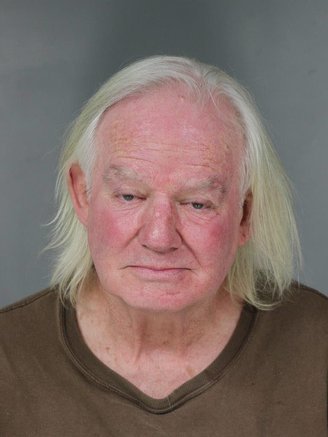It
was after a day of heavy drinking, and David Alan Kobak and his
long-time buddy Frederick “Fred” Loftus were back at Kobak’s
Seventh Street apartment, with Kobak cooking dinner.
Then, Kobak told Eureka police, Loftus walked into the kitchen, insulted him and hit him a couple of times in the face.
“I couldn’t help myself,” Kobak reportedly said. He went to his bedroom and got his semi-automatic rifle, opening fire on his friend and hitting him eight times. Loftus, 58, was lying dead near a pool of blood when police arrived minutes after Kobak called 911.

Kobak.
Not
surprisingly, visiting Judge Graham Cribbs held the 75-year-old Kobak
to answer this morning on a charge of murder.
Only one witness, EPD Senior Detective Ron Harpham, testified today during Kobak’s preliminary hearing. Harpham said he interviewed Kobak about an hour after the shooting, beginning by advising him of his Miranda rights.
“I don’t have no rights,” Kobak reportedly said. “There are no rights here. I fucked up. I killed my buddy … This guy is my buddy and he pissed me off and I guess I pissed him off. He smacked me a couple of times. It didn’t leave any marks but it hurt. Now he’s dead and that is the worst thing in the world.”
At the beginning of the interview Kobak was given a breathalyzer test, which came back with a reading of .16, or twice the legal limit for driving. Loftus’ blood alcohol level was .17, Harpham testified. No other substances were found in his system
Under questioning by Deputy District Attorney Whitney Barnes, Harpham said Loftus and Kobak had been friends for 40 years and had worked together on many commercial fishing boats. Usually Kobak was the captain and Loftus his helper. Loftus sometimes stayed with Kobak but “wasn’t a tenant,” the detective said.
On Aug. 25, the day of the killing, Kobak and Loftus met about 1 p.m. at Ernie’s bar in Eureka. They then went back to Kobak’s place and apparently continued drinking, with Kobak telling Harpham that “we drank a lot that day.”
When Loftus walked into the kitchen as he was cooking, Kobak told Harpham, he started insulting him, with the insults so vile that Kobak refused to say what they were. Then Loftus reportedly hit him two or three times in the face, and Kobak headed for the bedroom and his rifle.
“He stepped back into the room,” Harpham said, and Loftus was standing in the kitchen and started moving toward him. That’s when he started pulling the trigger.
Asked how many times he fired, Kobak said he didn’t know.
“The gun’s got 30 rounds in it,” he told Harpham. “How many casings are left?”
Casings, bullets and bullet fragments were scattered around, Harpham said. Ten bullets were found, with 8 bullets striking Loftus. Two bullets had passed through the carpet and hit concrete. One was found in the refrigerator.
“What led him to shoot?” Barnes asked.
“The only motive that David Kobak gave me for shooting Mr. Loftus was that he made him angry,” Harpham said.
Whether Loftus actually struck Kobak in the face is in question. Kobak had no facial or upper-body injuries, and no injuries were found on Loftus’ hands.
Deputy Public Defender Luke Brownfield, cross-examining Harpham, focused mainly on Kobak’s level of intoxication. During the 911 call when he reported the shooting, he was slurring his words, the detective said. When the dispatcher asked Kobak where he’d shot Loftus, he said “all over I guess. He was going to beat me up. He hit me two or three times. I couldn’t help myself.”
When being handcuffed, Kobak told the arresting officer he was having trouble walking “because I’m drunk.”
Brownfield
asked Harpham whether he had talked to any of the men’s friends
about how they acted when drinking.
Harpham said a Crescent City man told him Loftus “was usually pretty friendly when he drank, but if you pushed him he could get angry.”
A former girlfriend of Kobak’s told the detective “Loftus could get drunk and be an asshole but otherwise the two men got along.”
Later Barnes asked Harpham about Kobak’s behavior while drinking. He said the same Crescent City man, who knew both men, said Kobak didn’t get violent but “he became a bully.”
Kobak, sitting next to Brownfield during the hearing, said nothing and looked down at the table most of the time.
His arraignment on a charge of murder is scheduled for Feb. 15.
###
PREVIOUSLY:
- EPD: 75-Year-Old Man Arrested for Murder After Calling Police to Report Fatal Shooting
- UPDATE: EPD Releases More Information on Last Night’s Fatal Shooting on 7th Street
- Elderly Eureka Man Pleads Not Guilty to Murdering His Roommate; Bail Increased to $2 Million for Suspect in Friday Night Shooting
- Hearing Delayed in the Case of Elderly Eureka Man Accused of Shooting His Roomate to Death
- Hearing Date Set for Eureka Man Accused of Murdering Roommate Before Calling Cops
- ANOTHER CONTINUANCE: Eureka Man Accused of Killing Roommate Has Preliminary Hearing Postponed
CLICK TO MANAGE